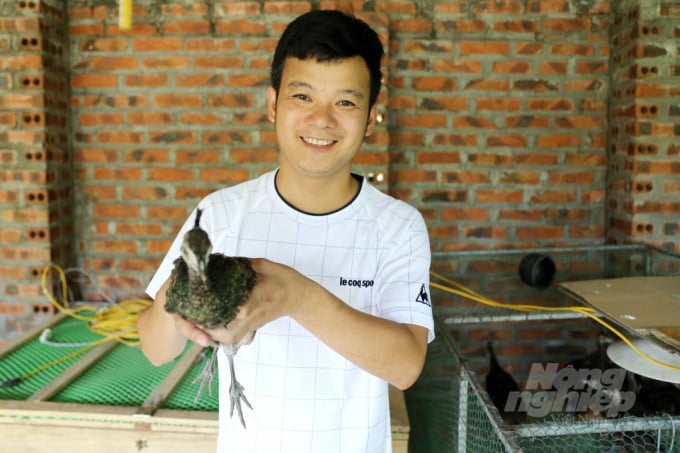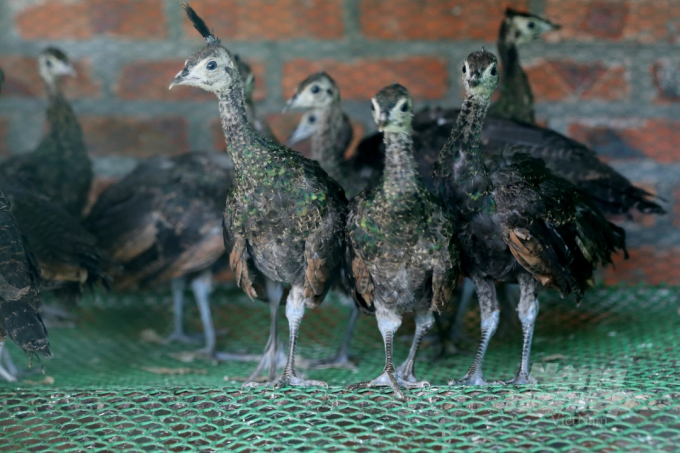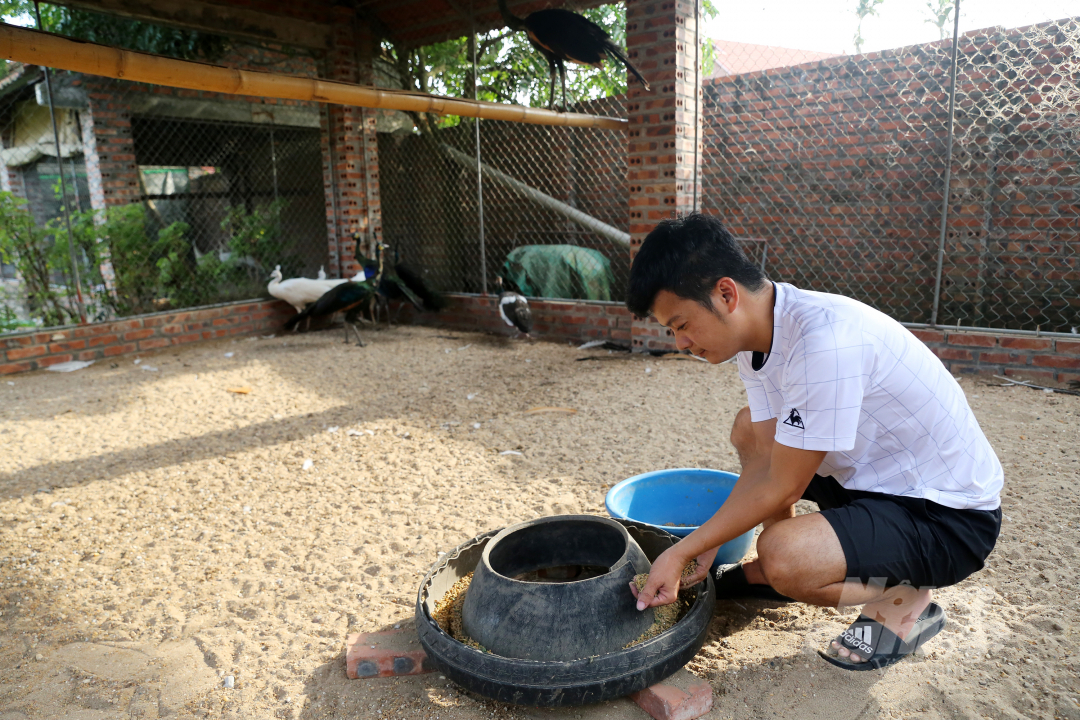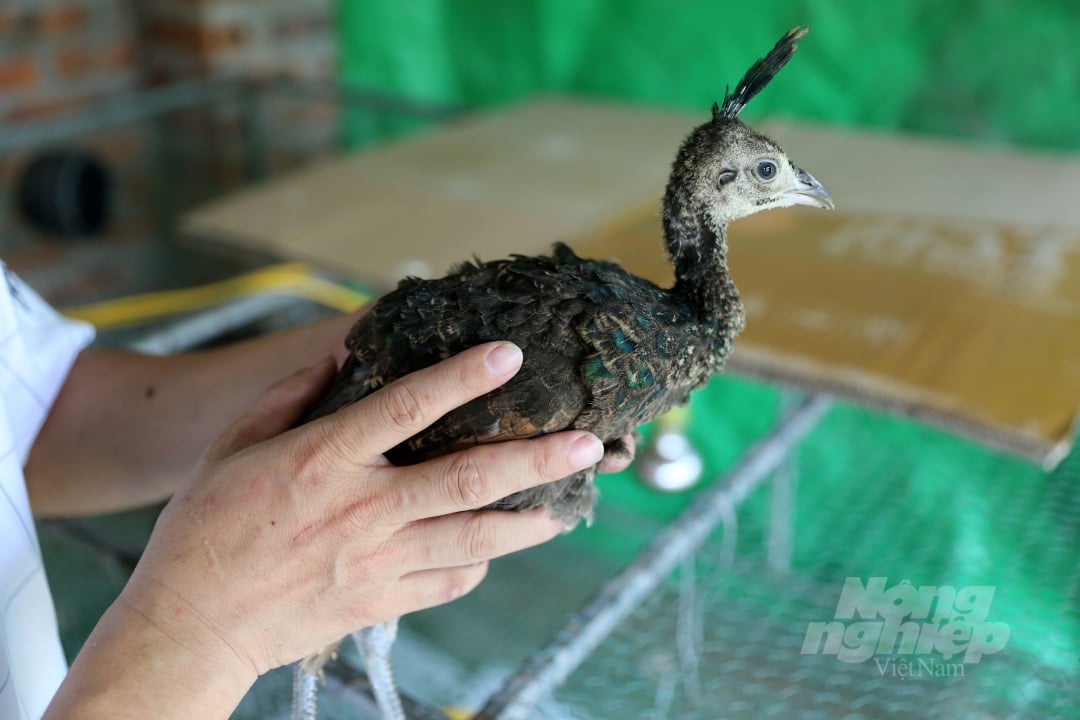June 20, 2025 | 12:50 GMT +7
June 20, 2025 | 12:50 GMT +7
Hotline: 0913.378.918
June 20, 2025 | 12:50 GMT +7
Hotline: 0913.378.918
A graduate from Hanoi University of Science and Technology, Phuong had experienced various jobs and tried raising many wild animal species at his hometown before choosing to raise peacocks, which has provided him with a stable source of income.

To have beautiful peacocks, Phuong has to travel to many places from the north to the south to find and buy the breeding birds at a high price. Photo: Dieu Vy.
“In 2015, only a dozen people raised peacocks in Vietnam. Peacock is a species listed in the Red Book of Vietnam, so I had to travel from the north to the south to find and buy breeding birds. Accumulating around VND92 million, including my personal budget and loan, I managed to buy a pair of Indian blue peacocks, several breeding 7-color pheasants, green ring-necked pheasants and multiple spur chickens,” he called.
Riskily investing in a precious bird breed, Phuong got determined to put all his heart into taking care of the first pair of peacocks. After a while, this pair of peacocks laid 1 egg that was incubated by a hen. He was both happy and worried when the egg hatched due to hiss lack of experience caring for this precious baby bird.
Besides putting the peacocks in a plastic cage placed next to his bed for better daily care and monitoring the bird’s behavior, he has also consulted references on the internet or broadcasted on the radio to learn how to raise peacocks effectively. Thanks to accumulated experience and constant efforts, more and more baby peacocks have been born. After uploading photos of these baby peacocks to social networks, Phuong had his first customers and sold for VND1,5 million each.
"I posted photos of baby peacocks on my personal facebook page and received loads of comments. At times there were not enough baby peacocks to sell. Until that time did my family feel secure with my decision,” he said.

Peacock barns need to be spacious and airy, preferably placed outdoor. Photo: Dieu Vy.
Recollecting his peacock breeding journey, Phuong admitted there have been many achievements but also difficulties that might sometimes dampen his passion.
For example, he once bought a pair of white peacocks with VND45 million. After laying 1 egg, the female got sick. He had to feed it with each spoonful of porridge and inject many drugs into the bird, but in the end, the female peacock still unfortunately died.
To build the peacock farm as it is today, Phuong has also had to get over many other challenges, from having to invest a large amount of money to having a chance to buy pure and endemic pairs of peacocks.
Pointing to the barn in which one male and three female golden-cheeked peacocks are kept, he said: "I had to travel all the way to Gia Lai to buy them for VND140 million. Normally, they are hard to be bought online or in groups. If you want to buy this precious bird for breeding, in addition to searching and waiting, you also need luck."

According to Phuong, raising peacocks is not too complicated if the farmers follow certain processes. Photo: Dieu Vy.
Peacocks need to be raised in large barns. Each barn of about 20m2 wide will pair 1 male with 3 breeding females. Large-scale farmers can invest in semi-natural barns, meaning that half of the barn has a roof and a bridge for birds to perch and the rest is covered with nets for natural sunlight so that the peacocks could have a space for sunbathing that helps increase their resistance and beautiful feathers.
Taking care of this bird does not take much labor as it only demands feeding, drinking and cleaning the barn twice a day, in the morning and afternoon.
"Peacocks are feathered birds, so they can be fed with simple foods such as bran, vegetables, peanuts, and vitamin supplements. During their breeding period, they could be fed with fresh bait such as worms, crickets or beef,” the peacock barn owner shared his tips.
Despite belonging to the same family as chickens, peacocks breed seasonally from February to June of the lunar calendar and lay every other day (lay one egg every 2 days) and in the afternoon. Farmers need to pay attention to timely collect eggs for incubators, he added.
Realizing the potential for peacock breeding, Phuong decided to borrow money from a bank to buy more breeding birds and extend barns. After 7 years, he now has a barn of about 4,000m2 raising dozens of breeding female birds.

Peacock is a species in the Red Book of Vietnam, so the farming process needs to comply with the provisions of the law. Photo: Dieu Vy.
At Phuong’s farm, the most expensive peacock breed (1 month old, vaccinated) is the yellow-cheeked peacock that is sold at the price of VND3.5 million each, the white peacock at VND 2.5 million each and green peacocks at VND1 million each.
Overcoming many difficulties, Phuong has not harvested success with his peacock farming model, which has brought his family high income to pay off all debt, build a spacious house and build up their savings.
Phuong recommends that peacocks are listed in the Red Book of Vietnam, so buyers have to buy breeding birds at establishments licensed by the Forest Protection Department. The raising process must also be registered to avoid violating the law.
Sharing more about experience to care for sick peacocks, he said: “There is still no specialized medicine for peacocks. Therefore, when birds are sick, they are mainly treated with chicken medicine. Peacocks have good natural resistance. By the time the bird reaches 1 year of age, the natural resistance is very high so at this time the peacock will almost no longer get sick.”
Translated by Phuong Ha
/2025/06/17/3942-2-143243_548.jpg)
(VAN) Recently, in Sweden, the Secretary of the Binh Dinh Provincial Party Committee presented the Investment Registration Certificate for the 'Polyester Fabric Recycling Complex' project to SYRE Impact-AB Company.
/2025/06/12/3721-2-202745_83.jpg)
(VAN) TH made an impression at Seoul Food 2025 with its line of natural beverages, paving the way for Vietnamese food products to enter the South Korean market.

(VAN) Soc Trang's success in rice exports stems from a strategy of developing fragrant and specialty rice cultivation areas and standardizing production toward low-emission practices.
/2025/06/11/1311-5-120811_839.jpg)
(VAN) The pig farming industry is facing the challenge of comprehensive restructuring to meet requirements for quality, safety, traceability, and market expansion both domestically and for export.

(VAN) Vietnam considers participating in ALGROALBA in order to expand agricultural production, coordinate the assessment and effective exploitation potential land.
/2025/06/05/5314-1-184727_407.jpg)
(VAN) From seemingly worthless fish scales and skin, enzymes and lactic ferments can transform by-products into peptides, opening a sustainable, effective business direction and elevating Vietnamese seafood.

(VAN) TTC AgriS and IFC signed a strategic partnership to develop a sustainable agricultural value chain, aiming to achieve the Net Zero target by 2035.